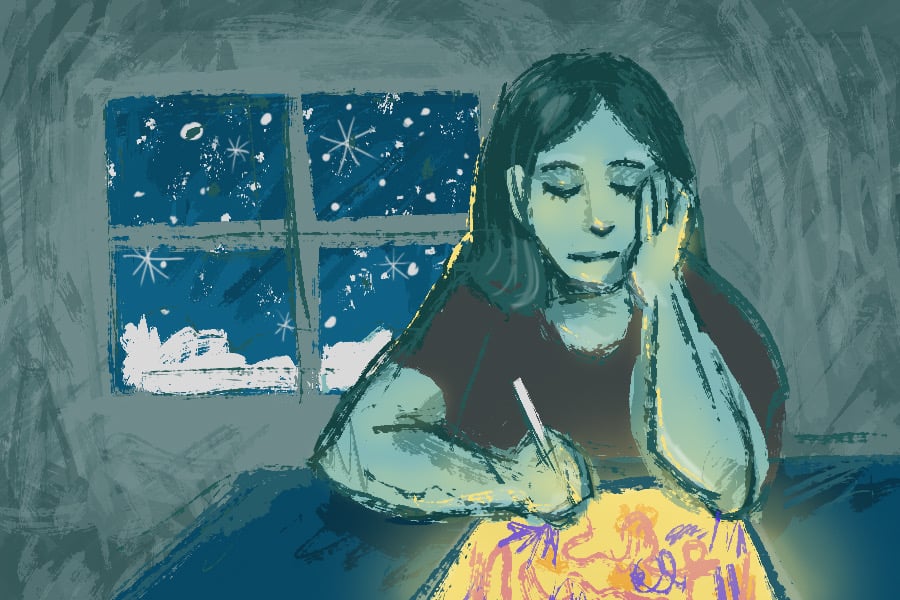Evanston therapists facilitate healing through art
Daily file illustration by Cynthia Zhang
Art therapy can help people process their emotions, according to Evanston social worker Janice Fleckman.
April 20, 2023
Evanston social worker Janice Fleckman knows the pain of losing a loved one. When Fleckman was overwhelmed with grief over her mother’s death, she said she turned to painting to cope.
“It was my way of expressing the loss,” Fleckman said. “Art is so good for expressing loss. I realized that it could be healing for other people.”
Fleckman is one of several Evanston therapists who uses art to facilitate healing among her clients. Her experience mourning her mother’s death inspired her to create Honoring Our Lost Mothers And Others, a group where people use art to express the loss of loved ones.
During therapy sessions, Fleckman hands participants a piece of paper in the shape of a circle and has them draw whatever comes to mind. She then asks them to describe what they see in their art.
Fleckman said she has heard from many participants the program has helped them become more in tune with their feelings.
“It was really amazing how much healing happened in the period of six weeks,” Fleckman said. “I think that’s because art gets at those unconscious feelings in a nonverbal way, and then, in the writing, they can start making more sense of it.”
Art can be a powerful vehicle for healing in historically marginalized communities, according to Melissa Raman Molitor, an Evanston-based art therapist.
Molitor co-founded the Evanston nonprofit organization Studio 3 with fellow art therapist Angela Lyonsmith during the height of the COVID-19 pandemic. The organization, formerly known as Kids Create Change, uses the arts to promote sociocultural awareness in youth.
“It can be less daunting to engage in conversations around racism and discrimination in a creative way,” Molitor said. “There isn’t that pressure of finding the right words and utilizing the right language.”
Molitor said she recognizes her therapy model is not “traditional,” as it focuses on the larger systemic issues that affect an individual’s mental health. She believes society has a tendency to “problematize” mental illness and view it as the individual’s problem.
However, Molitor centers her therapy around community and collective healing.
“It’s really part of a larger societal and communal issue,” Molitor said. “I’ve always been much more interested in how we build relationships and tell stories (by) utilizing art and how that can be healing.”
Fleckman and Molitor are members of Evanston Made, a nonprofit aiming to increase the visibility of Evanston artists and foster community among local creatives. It currently has around 400 members, according to founder and co-Director Lisa Degliantoni.
Degliantoni said she would like to see the city invest more in the arts. The City of Evanston’s budget for 2023 is $397.2 million. However, only $590,457 of the total budget — approximately 0.15% — is being allocated to cultural arts programs and the Noyes Cultural Arts Center combined.
“I would love the citizens of Evanston to commit to supporting the arts and being arts patrons,” Degliantoni said. “We can keep this community artsy and interesting. We just have to engage with it more.”
Email: emmasullivan2025@u.northwestern.edu
Twitter: @EmmaSullivanNU
Related Stories:
— Northwestern’s student-led Niteskool elevates student artists
— Evanston Made artists showcase 3D and fiber art in exploratory series
— Evanston organization celebrates 40 years of healing through art


